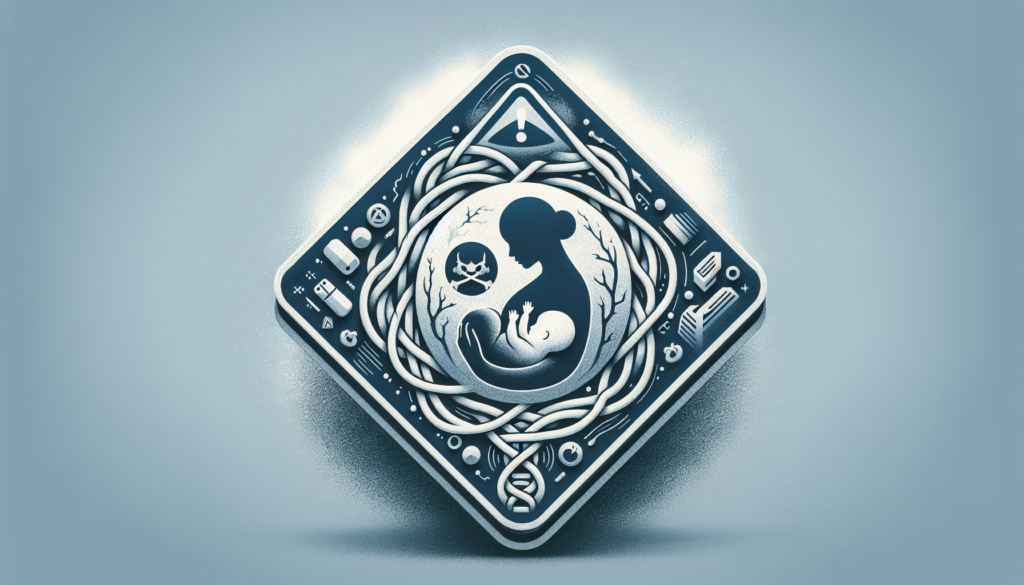Pregnancy is a beautiful and exciting time in a woman’s life, as she eagerly awaits the arrival of her little one. However, it’s only natural for concerns to arise, and one question that may cross your mind is whether herpes poses any risks during pregnancy. In this article, we will explore the potential dangers of herpes for expectant mothers, shedding light on the topic to alleviate any worries you may have. So, let’s unravel the truth and equip you with the knowledge you need to ensure a safe and healthy pregnancy journey.


What is Herpes?
Herpes is a common viral infection caused by the herpes simplex virus (HSV). There are two main types of herpes, namely HSV-1 and HSV-2. HSV-1 is typically associated with oral herpes, while HSV-2 is primarily responsible for genital herpes. Both types of herpes are highly contagious and can be transmitted through direct contact with the sores or lesions of an infected individual.
Types of Herpes
As mentioned earlier, there are two types of herpes: HSV-1 and HSV-2. HSV-1 is commonly transmitted through close contact, such as kissing or sharing utensils with an infected person. This type of herpes typically causes cold sores or fever blisters around the mouth and can also be responsible for genital herpes. On the other hand, HSV-2 is primarily transmitted through sexual contact and is mainly responsible for genital herpes. It is important to note that both types of herpes can be transmitted to either the mouth or the genital area.
Transmission of Herpes
Herpes is highly contagious, and it can be transmitted through various ways. The most common mode of transmission is through direct contact with the sores or blisters of an infected individual. This can occur during intimate sexual contact or when kissing an individual with a cold sore. It is also possible to contract herpes from an individual who has the virus but does not exhibit any visible symptoms. Additionally, herpes can also be transmitted through sexual activity, including oral, vaginal, or anal sex.
Herpes and Pregnancy
Herpes infection during pregnancy can raise concerns and potential risks for both the mother and the unborn baby. It is essential for pregnant women to be aware of the potential effects of herpes and the steps they can take to manage the infection.
Herpes Infection during Pregnancy
If a pregnant woman contracts herpes for the first time during the first or second trimester, there is a risk of transmitting the virus to the baby. However, if a woman has a pre-existing herpes infection prior to pregnancy, the risk of transmission to the baby is significantly reduced. It is crucial for pregnant women to disclose their herpes status to their healthcare provider to ensure appropriate management and preventive measures are in place.
Effects on the Mother
Herpes infections in pregnant women can cause discomfort and symptoms similar to non-pregnant individuals. These symptoms may include painful sores, itching, tingling, and flu-like symptoms such as fever and fatigue. However, the primary concern for pregnant women with herpes is the potential transmission of the virus to the baby during childbirth.
Transmission to the Baby
The greatest risk of transmission occurs when a pregnant woman contracts herpes for the first time near the time of delivery. The virus can be transmitted to the baby through direct contact with active lesions during vaginal delivery. This is known as neonatal herpes, and it can lead to serious complications for the baby. The risk of transmission can be significantly reduced by taking preventive measures, such as antiviral medications and possible delivery methods.
Symptoms of Herpes
Herpes symptoms can vary depending on the individual and the type of herpes infection. Common symptoms of herpes include the development of painful sores or blisters, itching, tingling sensations, flu-like symptoms, and swollen lymph nodes. These symptoms can be present in both oral and genital herpes infections. It is important to note that some individuals may be asymptomatic carriers, meaning they carry the virus but do not experience any visible symptoms.
Diagnosing Herpes during Pregnancy
If you suspect you have herpes during pregnancy, it is crucial to consult your healthcare provider for a proper diagnosis. Your healthcare provider will typically perform a visual examination of the sores or blisters and may swab the area for laboratory testing. Additionally, blood tests may be conducted to detect the presence of herpes antibodies. It is vital to get an accurate diagnosis to ensure appropriate management and prevention of transmission to the baby.
Managing Herpes during Pregnancy
Managing herpes during pregnancy involves various strategies to prevent transmission, ensure the mother’s well-being, and reduce the risk of complications for the baby.
Preventing Herpes Transmission
To prevent herpes transmission during pregnancy, it is important to avoid coming into direct contact with the sores or blisters of an infected individual. This includes practicing safe sex, using condoms, and avoiding sexual activity during outbreaks. Regular handwashing and avoiding sharing personal items can also reduce the risk of transmission.


Antiviral Medications
For pregnant women with a history of herpes outbreaks, antiviral medications may be prescribed to manage the infection and reduce the risk of transmission. These medications, such as acyclovir or valacyclovir, can help control outbreaks, shorten their duration, and lower the chances of viral shedding. It is essential to follow the prescribed dosage and consult with a healthcare provider before starting any medications during pregnancy.
Counseling and Support
The psychological impact of a herpes diagnosis during pregnancy can be significant. Pregnant women diagnosed with herpes may experience anxiety, fear, and stress. Seeking counseling or joining support groups can provide emotional support and guidance on coping strategies. These resources can help pregnant women navigate the challenges of managing herpes while ensuring a healthy pregnancy.
Potential Complications for the Mother
While herpes itself does not pose severe risks for the mother, complications can arise during pregnancy if a herpes outbreak occurs near the time of delivery. In such cases, a healthcare provider may recommend alternative delivery methods to reduce the risk of transmission to the baby.
Pregnancy Complications
If a pregnant woman experiences an active herpes outbreak during the third trimester, there is a risk of complications such as preterm labor or premature rupture of membranes (PROM). It is crucial for pregnant women to maintain regular prenatal care and communicate any herpes symptoms to their healthcare providers.
Neonatal Herpes
Neonatal herpes is a rare but potentially life-threatening condition that occurs when a baby is born to a mother with an active herpes infection. It can lead to serious complications, including central nervous system involvement and organ failure. Prompt recognition of symptoms and immediate medical intervention are critical in treating neonatal herpes.
Antiviral Medications
Antiviral medications are often prescribed to pregnant women with a history of herpes outbreaks or active lesions to reduce the risk of transmission to the baby. These medications can help suppress the virus and minimize the chances of viral shedding during childbirth. However, it is important to note that antiviral medications may not eliminate the risk entirely, and other preventive measures should also be implemented.
Alternative Remedies
Some individuals may consider alternative remedies or natural treatments for herpes management during pregnancy. However, it is essential to consult with a healthcare provider before trying any alternative therapies, as their safety and effectiveness may vary. It is crucial to prioritize evidence-based medical treatments and follow the guidance of healthcare professionals.
Safeguarding against Herpes
Preventing herpes infection during pregnancy involves practicing safe sex, using condoms, and avoiding contact with active sores or lesions. Additionally, maintaining good hygiene, such as regular handwashing and not sharing personal items, can reduce the risk of transmission.
Educating about Herpes
Raising awareness and educating oneself about herpes is crucial in preventing the spread of the virus. Individuals should be aware of the modes of transmission, the importance of regular testing, and understanding that herpes can be managed with proper medical care. Sharing accurate information about herpes can help reduce the stigma associated with the infection and provide support to those affected.
Psychological Impact
A herpes diagnosis during pregnancy can have a significant psychological impact on the individual. Women may experience feelings of guilt, shame, or anxiety regarding the transmission of the virus to their baby. Seeking emotional support from healthcare professionals, loved ones, or support groups can provide reassurance and coping strategies to navigate through these emotional challenges.
Support groups
Joining support groups specifically designed for individuals with herpes can be immensely helpful during pregnancy. These groups offer a supportive environment where individuals can share their experiences, ask questions, and receive guidance from others who have gone through similar situations. Sharing experiences and receiving support can help pregnant women feel empowered and better equipped to manage herpes during pregnancy.

Vaginal Delivery
For pregnant women with a history of herpes outbreaks or active lesions, a vaginal delivery may still be possible. However, specific precautions are taken to minimize the risk of transmission to the baby. This may include monitoring for active outbreaks, potential use of antiviral medications, and closely observing the baby for any signs of neonatal herpes.
Cesarean Section
In cases where a pregnant woman has an active herpes outbreak near the time of delivery, a cesarean section (C-section) may be recommended. A C-section can significantly reduce the risk of transmission to the baby by avoiding direct contact with infected birth canals or lesions. The decision to perform a C-section will be made by the healthcare provider based on individual circumstances and risk factors.
Conclusion
Herpes can pose potential risks and complications during pregnancy, but with proper management and preventive measures, the risks can be significantly minimized. It is crucial for pregnant women to communicate openly with their healthcare providers about their herpes status and adhere to recommended guidelines for managing the infection. By taking proactive steps and seeking appropriate support, pregnant individuals can successfully navigate herpes while ensuring a healthy pregnancy and delivery.



